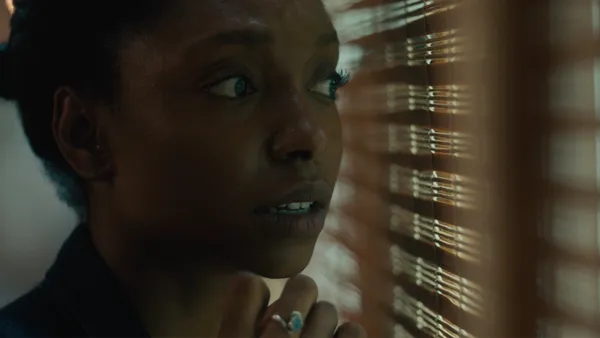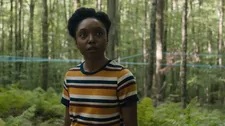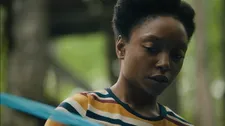 |
| Inheritance |
Winning praise at the Atlanta Film Festival, RiverRun International Film Festival and Palm Springs International ShortFest, Annalise Lockhart’s Inheritance is a film which packs a weight of history into its 14 minute running time. It's the story of a Black family who find themselves watched by the ghosts of white people who lurk outside their quiet woodland home, and of how one young woman, only able to see them after coming of age, learns to live with this. Annalise agreed to answer some questions about the film and how it developed.
Jennie Kermode: You've done a lot of second unit work, on some impressive material. What made you feel that now was the right moment to strike out on your own as a director?
Annalise Lockhart: I started assistant directing straight out of college. I didn’t go to film school, so I saw working on as many films as I could to be as good a path as any to learn how to make a movie! I wanted to strike out on my own as a director for years, and I needed to just take the plunge as some point. There was never going to be a 'perfect' moment. If you’re going to do something, you have to go do it!
JK: Modern ghost stories often seem to struggle with the idea that ghosts can't physically hurt us, and change the 'rules' of the genre to get around that. Did you want to show that physical contact is not the only way to do harm?
 |
| Looking back |
AL: That’s a good point, I hadn’t considered the fact that ghosts not being able to physically harm us could be a problem specifically for the modern era. But that makes sense. I think of ghosts/spirits/hauntings historically to be a reflection of whatever insecurities and fears most preoccupy a given culture. For this family, I wanted to show how insidious being surveilled over decades would be. I think of it as a metaphor for Black folks in society – we are haunted by never ending observation.
JK: Does the film reflect your own experiences, or friends' experiences, of being stared at and treated like an outsider?
AL: Absolutely. We shot the film at my mother’s cabin in Shrewsbury, Vermont. I have so many fond memories of playing in the woods surrounding the cabin, feeling that when I was there I could truly escape and be alone – almost invisible. This was in stark contrast to the life we normally led in Brooklyn, where I was aware at times of being watched or scrutinised. I wanted to tell a story about a Black family fighting for their hard-earned home, while addressing the ways stereotypes from the 'real world' can follow us into the 'natural world'.
JK: Norra doesn't see the ghosts until she receives the deed for the property. Does this suggest that white people don't care about black people until they gain some measure of power, or take up space, by owning something? Or did you intend to imply that they have always been watching her and she just hasn't noticed before?
AL: Right – the passing down of the deed really angers the ghosts. They hate it. In addition to the deed conferring more power onto the next generation of the family, it’s a reminder to the ghosts that the land is moving even further out of their control. The deed also symbolises Norra coming of age – implying that she has lived in this sort of youthful ignorance, where her father and brother purposefully shielded her from the truth. The same way many of us 'awaken' to the realities of prejudice when we get to a certain age. In Norra’s case, I think her father really hoped that she would never be able to see them – that she would be spared.
JK: In the film, the family find a technological means of deterring the ghosts. Did you intend this to associate them with the future, and with a sense of taking control and making progress? Or is there an element of tragedy in them only being able to relax by making themselves invisible?
AL: With the technological element, I intended to show the family possesses resourcefulness. They use the tools at their disposal – maple tapping lines – as well as their connection to the land and trees, to create this forcefield. I wanted to show Tucker being next in the lineage of Black inventors.
 |
| Taking control |
Their choice to become invisible is complex – they did a lot of work to appease the ghosts, perhaps treating the symptom and not the root problem. On the other hand, they now have the ultimate control – they decide when and how they are perceived. That is quite a lot of power. Now they can actually set out to create and move forward with their lives because they have a home that is finally peaceful and quiet.
JK: Did you want to explore how the past continues to exert pressure even after things have begun to improve in the present?
AL: Yes – I wanted to show that the roots of colonisation are deep. In a sense, unfortunately, we in the US are literally haunted by the nation’s past.
JK: Did you choose the woodland setting to draw in archetypal elements of horror, or was it primarily an aesthetic choice?
AL: The cabin was a natural choice because we owned it and could control every aspect of the set (even though the house is pretty old and falling apart at the seams). Owning the house meant we could spend a lot of time constructing the maple tapping forcefield around the house, and test things out on our timeline. And of course yes, what’s spookier than being in the middle of the woods, surrounded by trees!
JK: How did you go about casting the film?
AL: I primarily cast the film online through casting notices, and I was just so lucky to have found Victoria [A Villier] and Ron [Brice] that way. I couldn’t have dreamt of a better film family.
JK: How do you feel about the attention that the film is now receiving?
AL: I’m honestly so humbled by the attention the film is receiving. It’s been a long journey – I think I wrote the first draft of the script fall of 2017. I’m amazed at how far the story has come, and I’m so happy that it’s out in the world.
JK: What do you plan to do next as a filmmaker?
AL: I’m developing a feature with some of the themes explored in Inheritance as a jumping off point. I have another short coming up soon – science fiction as well!





















